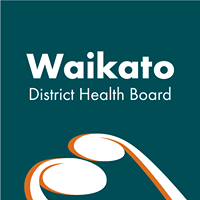Media Release
Date: 13 December, 2012
Co-operation
brings rewards
A relationship initiated by Waikato District Health
Board staff and community health workers in the Huntly area
has paved the way for better access to health services for
Maori.
It’s also saving a lot of time and cutting costs.
Allied Health’s Ngaruawahia-based team have slashed their “no show” numbers and gained a better uptake from many Maori families by linking with Waikato’s Raukura Hauora O Tainui’s disability support team, chronic disease management nurse, and community health workers.
The DHB's Allied Health professional team is made up of physiotherapist Shelley McConnel, social worker Stephen Chong and occupational therapist Andrew Parkin.
Previous client misunderstandings about access to housing modifications and adaptive equipment have been gradually reduced since Andrew attended kaumatua meetings to explain his role and discuss the issues.
Community Health social work uses a strength-based perspective assisting people to help themselves with existing resources and sourcing new ones. “This includes working with agencies that already have strong working relationships with new and existing clients and Raukura Hauora O Tainui have been very responsive to working collaboratively,” Stephen says.
Physiotherapist Shelley McConnel used to have a big file of referrals for people she never saw as they weren't comfortable to accept interventions they didn’t understand from someone they didn’t know.
“Raukura Hauora O Tainui are part of the local community and are known to them. so now I phone the health care workers, they arrange for me to visit with them, introducing me, also keeping me up to date if needs change later on,” says Shelley.
The Raukura team help DHB staff meet with clients who are reluctant, shy or difficult to contact.
“They help us to contact and establish positive working relationships with whanau in the community,” Andrew says. “They are able to address specific barriers to whanau accessing services, help to explain our roles and the treatments we offer.”
Andrew says that means forming a relationship with the patient, and addressing the whole person.
Raukura Hauora O Tainui have identified benefits for them by linking with the DHB team – working together to solve problems and link their clients to other services as necessary – and getting to the heart of clients’ issues.”
Raukura health
care worker Max Noda says a trust has built up.
Processes
and criteria are explained and it also helps with
pre-screening of available DHB services.
Andrew says Raukura gets direct access to his team's multidisciplinary expertise. “Many local people are able to access our expert assessment and treatment in their own community. And being local, we are responsive to their clients’ needs, and able to be flexible in how we work.”
The two teams have been meeting formally for two years, usually twice a year. It’s a chance for DHB initiatives and any policy and criteria changes to be outlined, to strategise over individual patients, to share information, and to discuss problems like transport to the hospital.
“So now if we have a problem we can go straight to the Raukura team, we know who to call,” Andrew says.
“We are now more responsive to what’s happening in the community, and why clients have missed appointments.”
When an elderly man was struggling at home, the Raukura community health team got his housework sorted. His health came right as his living conditions improved and DHB services were accessed.
“That’s when sometimes we need to refer to an agency that goes the extra mile,” says Stephen.
ENDS
ENDS



 Research For Maori Health and Development: Bridging The Gap In HIV Prevention For Māori - Insights And Resources Now Available
Research For Maori Health and Development: Bridging The Gap In HIV Prevention For Māori - Insights And Resources Now Available Tertiary Education Union: Weltec And Whitireia Cuts A Shocking Blow For Their Communities
Tertiary Education Union: Weltec And Whitireia Cuts A Shocking Blow For Their Communities PHARMAC: Pharmac Proposes To Fully Fund Nutrition Replacements For Some People With Crohn’s Disease
PHARMAC: Pharmac Proposes To Fully Fund Nutrition Replacements For Some People With Crohn’s Disease Nōku Te Ao: Bringing Together Voices On Mental Distress, Stigma And Discrimination Under One Roof
Nōku Te Ao: Bringing Together Voices On Mental Distress, Stigma And Discrimination Under One Roof Office of Early Childhood Education: Early Childhood Education Sector Confidence Survey Results 2025
Office of Early Childhood Education: Early Childhood Education Sector Confidence Survey Results 2025 Bikesport NZ: Intrepid Kiwi Teen Ready To Accept New Challenge
Bikesport NZ: Intrepid Kiwi Teen Ready To Accept New Challenge